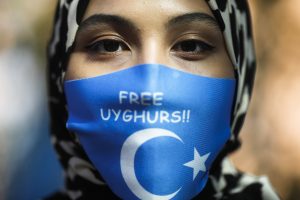When I saw an item in my newsfeed last week about “600,000 Uyghurs,” I knew it would be a tough read. I was right.
An internal Chinese government document prepared by Nankai University researchers gave this blockbuster figure for the number of Uyghurs taken away from our homeland by the government and forced to work in cities across China. But the real blockbuster was the intent: to reduce Uyghur population density so as to “assimilate” them better.
Adrian Zenz’s groundbreaking report on the “population density” plan confirmed what I knew about the government’s policy – it’s an all-out war, as I wrote for the Diplomat in 2018. But I wasn’t prepared for the emotional impact it had on me. Clearly, the Chinese state is intent on the post-modern equivalent of crushing our bones and scattering them across the land.
The last four years have brought one terrifying revelation after another about the “Strike First” policy launched in earnest in 2017. Arbitrary ethnic internment camps have been built to a huge scale across our entire homeland. Among the other tools of silent terror used against my people: hi-tech surveillance, forcible family separation, coerced labor programs, forced sterilizations, and long prison sentences for intellectuals.
In February, a months-long BBC investigation confirmed what Uyghurs had already heard from the handful of survivors: harrowing accounts of systemic rape. A survivor told BBC: “Their goal is to destroy everyone.”
Evidence of this intention was there to see even before the Nankai leak. Eyewitness accounts and video evidence of Uyghurs transported in “batches” across China circulated throughout 2020. In February of that year, as the rest of China was in COVID-19 lockdown, the government transferred Uyghurs around the country to work in factories. In July, the BBC asked former Chinese Ambassador to the U.K. Liu Xiaoming to explain drone footage from 2019 showing hundreds of heavily guarded, blindfolded, and shaven Uyghurs lined up to be loaded into trains. He replied without shame: “sometimes you transfer prisoners, in any country.”
Liu didn’t mention that not every country forcibly transfers hundreds of thousands of people from their homes and communities, and that not every country has placed millions of citizens in various states of brutal captivity and forced labor.
Following the U.S. Department of State genocide determination on January 19 this year, pundits and skeptics debated whether this situation constitutes a genocide. Some people have argued that although China appears to be committing some of the atrocities outlined in the Genocide Convention, there is still no clear evidence to prove intent, as required for such a determination.
A group of 50 independent experts disagree. Their new report, “The Uyghur Genocide: An Examination of China’s Breaches of the 1948 Genocide Convention,” concludes that intent “can be inferred from a collection of objective facts that are attributable to the State.” In this case, the evidence is copious, including “official statements, a general plan, State policy and law, a pattern of conduct, and repeated destructive acts, which have a logical sequence and result.”
The report concludes that the “totality” of these policies and acts in fact amount to “an intent to destroy the Uyghurs as a group, in whole or in part, as such.”
Dehumanizing language to refer to Uyghurs comes from the very top, attested to in leaked government documents, like the New York Times “Xinjiang Papers” exposé. Government documents quote top leader Xi Jinping comparing Islam to a virus-like “contagion” and saying that addressing it would require “a period of painful, interventionary treatment.” He added that the government must “show absolutely no mercy.”
Local authorities have obeyed. A Kashgar prefecture official stated that treatment of Uyghurs should “break their lineage, break their roots, break their connections, and break their origins.”
If this isn’t genocide, what is? I couldn’t sleep after learning of the Nankai report on the scale of forcible population transfers. The loop in my head was clear: We are running out of time.
If the world’s only response to genocide is to engage in endless debate of the term, and if a genocide is only a genocide once it’s over, then “never again” is truly an empty promise.
Uyghurs face an existential threat that cannot be ignored. States, multilateral entities, the private sector, and civil society must act with urgency before it is too late. States like the U.K. need to approve pending legislation conditioning trade on observance of labor rights.
Companies need to end their profits from supply chains that depend on forced labor of Uyghurs. Universities need to think twice about cooperation when hundreds of Uyghur scholars have disappeared or have already suffered death in custody, which is itself a crime against humanity. The United Nations needs to act on its charter to uphold human rights, and states need to act on their solemn obligations under the Genocide Convention “to prevent and to punish” this crime.
Action is imperative to bring some relief to my homeland, lest Uyghurs become a footnote in history. People complain that the 24-hour news cycle creates short memories, but short memory is a privilege Uyghurs like me don’t have. Our memory of the ongoing atrocities is acute, trapping us in a present so devastating and heavy that we sometimes wonder whether we dreamed our past, and whether it’s possible to hope for the future. May the world help us find that hope.

































